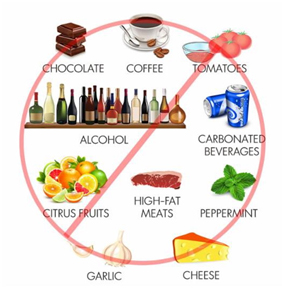Conventional wisdom tells us that we can resolve heartburn and GERD (Gastroesophageal Reflux Disease) quickly and easily with over-the-counter or prescription medications that neutralize stomach acid.
The common remedies include three classes of tummy-soothing options:
Let’s take a look at how they work:
Antacids neutralize stomach acid. Antacids include well-known over-the-counter tablets such as Tums and Rolaids, or liquids such as Maalox, Mylanta, and Gaviscon. But baking soda works just as well.
Antacids are relatively benign, although their effectiveness may vary, and they can decrease the bioavailability of certain common drugs such as tetracycline.
Also, when used in very high doses, antacids (including baking soda) can be extremely dangerous – hyperalkalinity (alkalosis) is a potentially fatal condition that is difficult to treat, even in hospital emergency environments. So be sure to follow the directions, and use baking soda in moderation. For further information, see the following Medline article. Alkalosis symptoms include:
- Confusion (can progress to stupor or coma)
- Hand tremor.
- Lightheadedness.
- Muscle twitching.
- Nausea, vomiting.
- Numbness or tingling in the face, hands, or feet.
- Prolonged muscle spasms (tetany)
H2 blockers block the action of histamine on acid-producing parietal cells on the gastric wall. H2 receptor agonists include Tagamet (cimetidine), Zantac (ranitidine), and Pepcid (famotidine).
 A special concern, especially with Tagamet, is that these drugs can inhibit the enzymes that control metabolism and excretion of other drugs such as Warfarin (an anticoagulant used to prevent heart attacks, strokes, and blood clots), and calcium channel blockers, thus increasing serum levels of these drugs.
A special concern, especially with Tagamet, is that these drugs can inhibit the enzymes that control metabolism and excretion of other drugs such as Warfarin (an anticoagulant used to prevent heart attacks, strokes, and blood clots), and calcium channel blockers, thus increasing serum levels of these drugs.
Proton pump inhibitors (PPIs), as the name implies, shut down the proton pumps that pump acid into the stomach. More general in their operation than H2 blockers, these drugs suppress histamine as well as other acid stimulants. Because there is some delay in the onset of their efficacy, they tend to be used in chronic conditions, whereas H2 blockers are used to treat acute conditions where an immediate effect is desirable.
As with H2 blockers, with proton pump inhibitors there are concerns about interactions with other medications. H2 blockers include Aciphex (rabeprazole), Nexium (esomeprazole), Prevacid (lansoprazole), Prilosec (omeprazole), Protonix (pantoprazole), and Dexilant (Dexlansoprazole)
As you can see, none of these medications are completely without safety issues, especially with ongoing use.
The chief concern is that they may reduce stomach acid, which is needed for healthy digestive function.
- Acid strengthens the gastroesophageal sphincter, helping to prevent reflux.
- Acid activates the digestive enzymes, facilitating the digestive process.
- Acid enables the absorption of major nutrients, including calcium, magnesium, B6 B12, folic acid and Vitamin D.
- Acid maintains a stomach environment not conducive to the growth of certain bacteria.
With insufficient stomach acid, there’s an increased susceptibility to pneumonia, an increase in osteoporosis (with resultant hip fractures), and an increased risk of other deficiency diseases and lower bowel problems.
A lack of stomach acid also weakens the gastroesophageal sphincter, allowing acid to go where it shouldn’t, resulting in burning and digestive distress.
Resolving heartburn can require a significant journey – one that includes weaning the body off drugs, and stabilizing digestion.
Let’s consider some factors that can help us on the journey to freedom from heartburn:
- Pressure on the abdomen, as in pregnancy, can add to heartburn miseries, by causing mild to severe hiatal hernias that need to be addressed before the pain can be alleviated.
- Sleeping on a slant can help.
- Citrus fruits, tomatoes, spicy foods, alcohol, and caffeine can aggravate heartburn, as can smoking. So these are best avoided.
- Naturopathic treatment options can include the use of deglycyrrhizinated licorice (DGL) to prevent the development of ulcers, and to protect and heal the tissue and soothe the pain.
- We can strengthen the gastroesophageal sphincter with probiotics, apple cider vinegar, and/or digestive bitters (which also stimulate enzyme production).
- Gamma oryzanol from rice bran oil can help tone the sphincter.
The following graphic shows some foods that can aggravate heartburn:
As with all disease, heartburn’s causes and manifestations are highly individual. Thus, it might be wise to consult a naturopathic practitioner who has experience with this condition. Understanding what’s happening in your individual gut is a good first step toward calming the digestive fires.
To discuss your health issues, including your digestive status, give us a call at (650) 917-1121, or leave us a message using the Contact Form. We’re happy to help!
Find out more about Dr. Connie’s work HERE.



